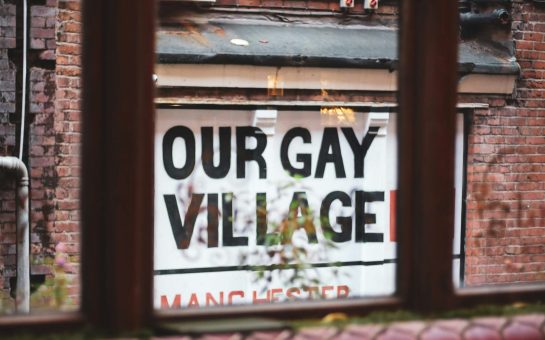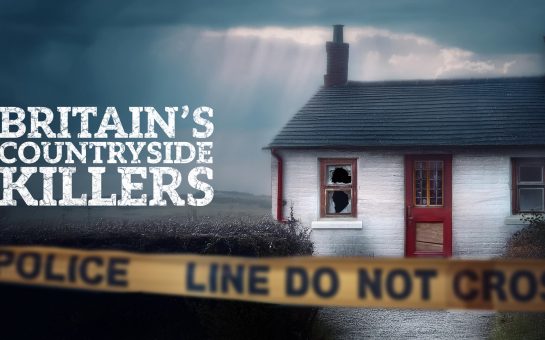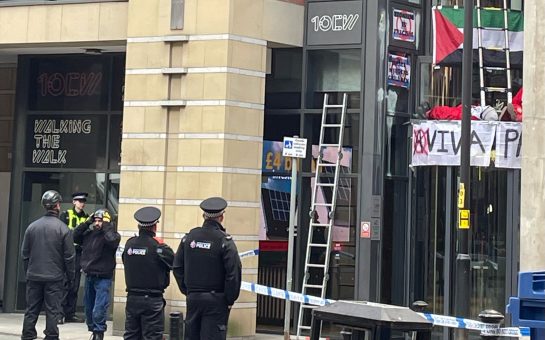A shocking number domestic abuse and rape incidents across Greater Manchester actually result in conviction, new figures have revealed.
Home Office figures for Greater Manchester, revealed by the Guardian newspaper, show that in 2009/2010 only 18% reported incidents resulted in a conviction, in 2011/2012 only 10% and in 2012/2013 only 14%.
Figures for 2010/2011 were not available from GMP.
Speaking about the drop in conviction rates for domestic violence, Joanne Simpson, manager of Independent Choices Women’s Domestic Abuse Helpline, told MM: “There are various factors that could explain the drop in conviction rate.
“Sometimes victims of domestic abuse are afraid of repercussions if their partner is prosecuted and so withdraw their statement or decide to give the relationship another hoping that things will improve.
“We encourage all victims to seek help if they are in an abusive relationship and we provide a confidential helpline so that women can explore their options and decide what is best for them.”
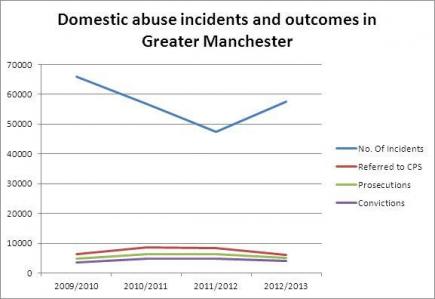
Although reported incidents in 2012-2013 across Greater Manchester have increased by 21% from 2011-12, convictions have in the same period have actually reduced by 17%.
The Government definition of domestic violence agreed in March 31 2013 is: “Any incident or pattern of incidents of controlling, coercive or threatening behaviour, violence or abuse between those aged 16 or over who are or have been intimate partners or family members regardless of gender or sexuality.”
Earlier this month, Oldham East and Saddleworth MP Debbie Abrahams challenged the Home Secretary Theresa May about the dramatic drop in the number of domestic violence cases being prosecuted.
Debbie Abrahams said: “Two women a week die at the hands of their partners or former partners.
“In Oldham, between October 2012 and September 2013, more than 5,300 women were subject to abuse, a third of whom were abused in front of children.
“With 13% fewer domestic violence cases being prosecuted, what are the implications for justice for these women?”
Theresa May, Home Secretary and MP for Maidenhead, replied: “Last year, the figures showed that 76 women lost their lives at the hands of a partner, ex-partner or lover. That is lower than in previous years, but even one such case is one too many.”
After the session Ms Abrahams said: “My residents’ survey in Oldham East and Saddleworth, which included round table sessions with local organisations and groups, helped shape my top ten priorities with one of them being to tackle domestic violence against women.
“A 13% overall fall in the number of domestic violence cases being referred to the CPS is appalling.”
Hazel Blears, Labour MP for Salford and Eccles, campaigned for the introduction of the Clare’s Law Domestic Violence Disclosure Scheme with the father of her constituent Clare Wood, who was murdered by her former partner George Appleton.
Clare had no idea that Appleton had a history of domestic violence.
But Clare’s Law, which was rolled out nationally this month, enables people to apply to find out if their partner, or the partner of a friend or relative, has a history of abuse.
Commenting on the figures, Ms Blears said: “While only 14% of reported domestic abuse incidents resulted in a conviction last year, 77% of prosecutions resulted in convictions.
“For rape, which can be more difficult to prove in court, 62% of prosecutions led to convictions.
“This suggests that where the police and CPS can put forward a strong case for prosecution, justice is being done more often than not.
“I am therefore concerned by the significant reduction in the proportion of reports of domestic abuse and rape being passed onto the CPS in 2012/13.
“Our police officers do a fantastic job in difficult circumstances but I have already raised concerns in the House of Commons about the impact of the Government’s cuts on policing in Greater Manchester, which can only make officers’ jobs more difficult.
“I would urge the Government to take on board Labour’s proposal to create a national Violence Against Women and Girls Commissioner to help ensure forces all over the country get the resources they need to tackle domestic abuse and sexual violence, and end the current postcode lottery.”
The conviction rates in rape are also very low. In 2012-2013 there were 960 offences recorded by Greater Manchester Police of which only 20% (192) resulted in convictions.
It has also got to be acknowledged that rape is notoriously under reported and under-recorded – the actual percentage of rapes leading to prosecutions is likely to be even lower.
Commenting on the figures, Tony Lloyd, Manchester’s Police and Crime Commissioner, said: “It’s very important that the criminal justice system gets this right. All too often victims of domestic violence and sexual assault have been let down by the system.
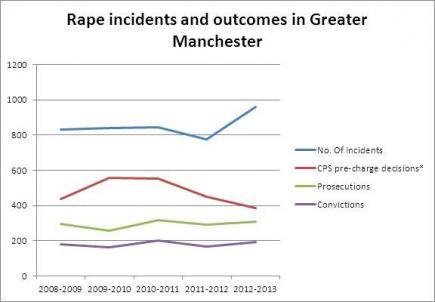
“Ultimately the voice of the victim must be heard, and the needs of those who have suffered be placed at the heart of the entire criminal justice system.
“There’s been real progress made to make it easier for victims to come forward but there’s still a long way to go. But what we do know is that there are still too many people who suffer in silence.
“We all have a responsibility as decent human beings – whether a friend, relative, teacher, neighbour, doctor – to speak out for victims and stand up against the perpetrators.”
Nationally the picture is very similar for conviction rates in reported domestic abuse and rape incidents, where the conviction rates are 11% and 15% although some areas perform considerably better than others.
Cheshire Police had the highest referral, prosecution and conviction rates at 32.8%, 26.6% and 21.7% respectively
The lowest performing area was Warwickshire police with referral, prosecution and conviction rates at 3.6%, 3.2% and 2.9% respectively.
Main image courtesy of the European Parliament, with thanks.
